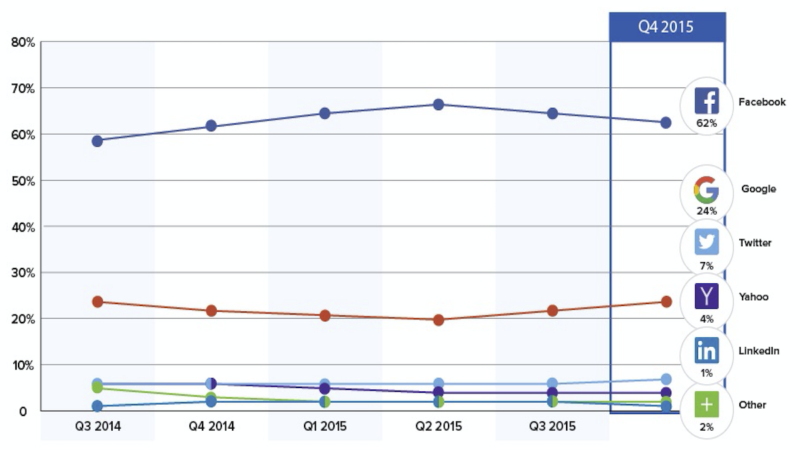Gigya Report: Facebook Still Dominates Social Logins But May Be Fading A Bit
The social networking giant has been dropping slightly since mid-2015 -- while Google has been gaining.
Facebook is still the king of social logins on websites worldwide, but its dominance may be on a slow decline.
That’s the big takeaway in the “Landscape of Customer Identity” Q4 report from customer identity management provider Gigya, out today.
Although Facebook credentials in Q4 account for 62 percent of all website social logins, the Gigya stats indicate that the social network peaked at 66 percent in second quarter of last year and has been slightly declining since then. But Google’s is 24 percent — and it has increased slightly over the last two quarters. In the second quarter of last year, Google was at 20 percent.
The other social logins were Twitter at seven percent, Yahoo at four percent, LinkedIn at one percent and Other at two percent.
A social login is when you employ your username and password from a given social network to log into another site. Depending on how your preferences are set, at least some of your profile is then made available to the other site.
“It is likely that Facebook’s decline can be attributed to the rise of Google’s social login adoption,” Gigya communications manager Reeyaz Hamirani told me.
“Google’s increase over the last two quarters may be attributed to the company’s unification of its services” under one unique ID per user, he said, covering subscribers to Gmail, YouTube, Google Drive and Google+.
“It is also possible that Facebook hit a saturation point once it peaked at 66 percent in Q2.”
By contrast, he said, the biggest surprise in the report is that “not only has Yahoo failed to cross the five percent mark for three consecutive quarters,” but that it has completely disappeared as a social identity provider for consumers on mobile applications or ecommerce properties.
Speaking of mobile, Facebook’s social login share on mobile apps grew by four percent in the fourth quarter, which apparently came from the two percent lost by both Google and Twitter. Facebook is huge on mobile, accounting for 80 percent, which Gigya said is helped in part by increased privacy controls.
The findings were obtained from samples of Gigya’s 700+ customers. The company has been issuing these quarterly reports for the last three years.
Contributing authors are invited to create content for MarTech and are chosen for their expertise and contribution to the search community. Our contributors work under the oversight of the editorial staff and contributions are checked for quality and relevance to our readers. MarTech is owned by Semrush. Contributor was not asked to make any direct or indirect mentions of Semrush. The opinions they express are their own.
Related stories
